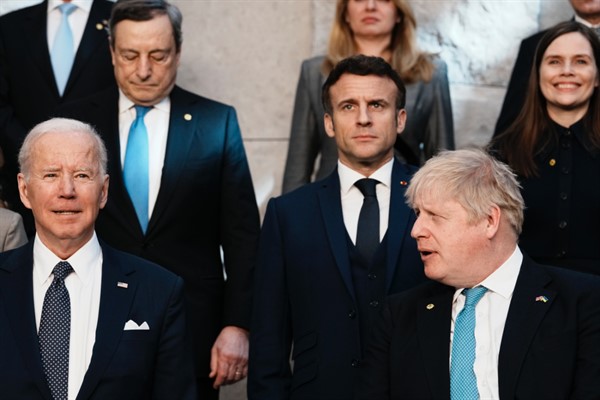European Union and NATO leaders gathered in Brussels today for a mammoth day of three major summits, all with overlapping guest lists. The first was a combined assembly of national leaders from NATO and the EU’s member states, which took place this morning at NATO’s headquarters in the city’s northeast. After that meeting, six of the NATO leaders were then joined by Japanese Prime Minister Fumio Kishida as well as the presidents of the European Council and European Commission for a G-7 summit that was also held at NATO’s headquarters. The final gathering featured 22 of the 30 NATO leaders, including U.S. President Joe Biden, who made the short journey across to the other side of town for a summit of the EU’s 27 leaders. That meeting is ongoing and is expected to last until later tonight.
The considerable overlap on display at the three summits, including their attendees as well as the agendas discussed at them, underscores how much—and how quickly—the West has formed a united front following Russia’s invasion of Ukraine. For the past month, EU officials have regularly attended NATO meetings and vice versa. And Finland and Sweden, which are members of the EU but not NATO, have been attending NATO meetings as guests. Two weeks ago, the overlap in attendees at the NATO and EU foreign ministers summits—which were held on the same day and featured the first attendance of a British foreign secretary at a European Council meeting since the U.K’s withdrawal from the EU—prompted one diplomat to wonder aloud whether it was even necessary to move to the other side of town for what was effectively a continuation of the same discussion, only at NATO’s headquarters rather than that of the EU.
But while the blurred lines between the EU and NATO might ostensibly point to a stronger-than-expected trans-Atlantic response to the outbreak of war in Europe, not everyone is excited about the convergence. Ireland and Austria, the most staunch proponents of “non-alignment” of the six non-NATO EU members, are getting increasingly nervous about it. And while France is nominally pleased to see other EU countries demonstrate more willingness to increase their defense spending and embrace its clamor for European strategic autonomy, Paris isn’t thrilled with the prospect of coordinating that stepped-up military preparedness within the structures of the U.S.-dominated NATO alliance. Paris had hoped to see the EU exercise more oversight when it comes to European defense, with the intention of establishing a European pillar within NATO that functions as a peer to the U.S., at least in theory.

